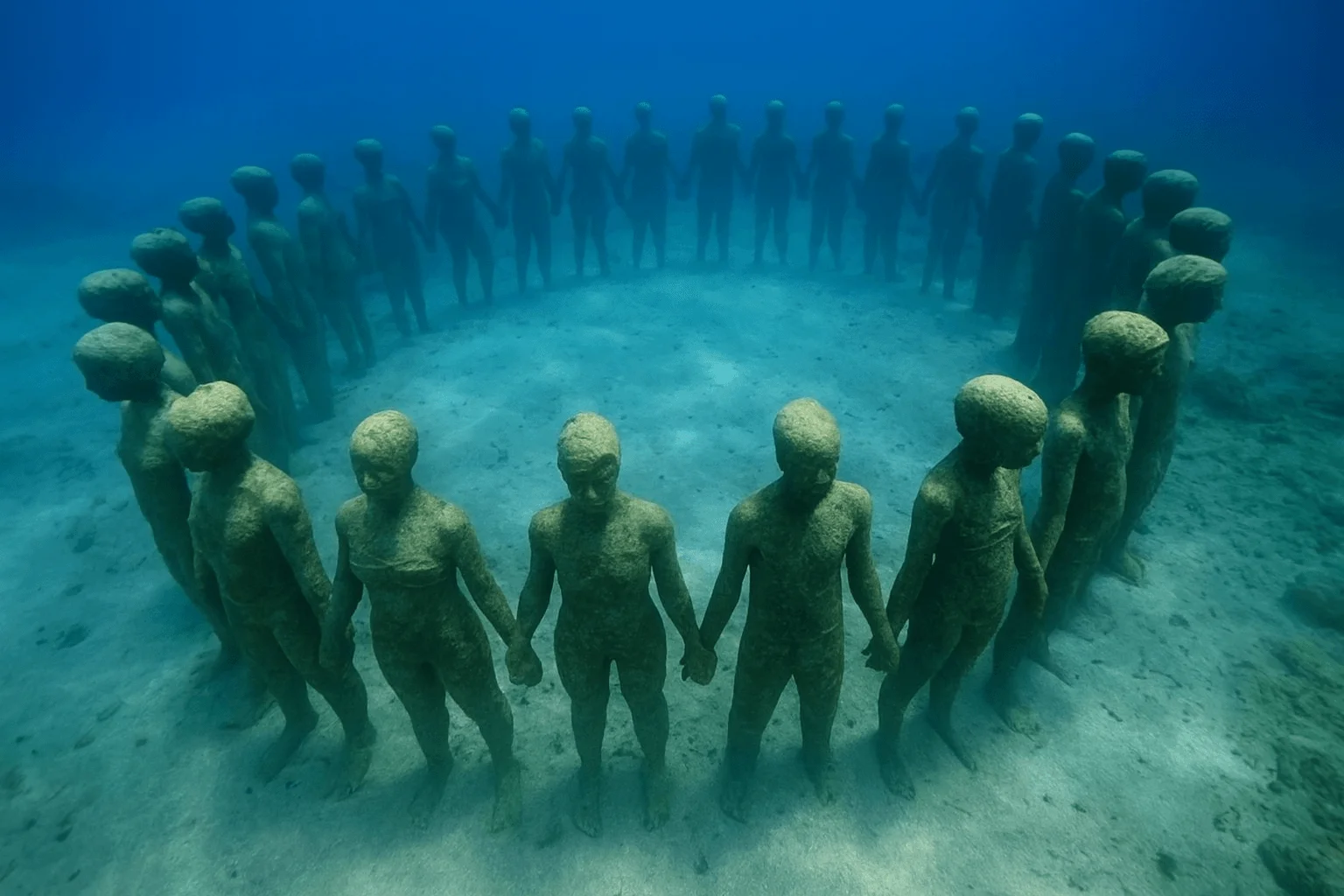Scuba Diving in Cancun
The Ultimate Guide
Situated on Mexico’s Caribbean coast, Cancun pairs world‑class resorts with unexpectedly rich underwater adventures. The warm, turquoise waters off the Hotel Zone and nearby Isla Mujeres host vibrant coral reefs, an underwater sculpture garden and historic wrecks. Visibility often exceeds 25 m and water temperatures rarely dip below 24 °C, so divers can explore year‑round. From calm shallow reefs teeming with tropical fish to adrenaline‑charged bull shark dives and seasonal whale shark encounters, Cancun offers something for every level of diver.
Difficulty
Moderate
Temperature
24-29°C
Visibility
24-35m

Diving Highlights
Best Months to Dive
Getting to Cancun for Diving
✈️Transportation
Fly into Cancun International Airport (CUN), a major hub with connections from North America, Europe and Latin America.
From the airport it’s a 20‑minute taxi or shuttle to the Hotel Zone where most dive centres are based.
Boats depart from Cancun and nearby Isla Mujeres to reefs and wrecks. Many divers also stay in Playa del Carmen or Isla Mujeres for easy access to bull shark sites and other coastal reefs.
Country
Mexico
Currency
Mexican Peso
Electricity
120V, 60Hz, Type A/B plug
Cost of a Dive Trip in Cancun
Day Trip
Dive Resort
Liveaboard
Meal
Accommodation
Best Dive Sites in Cancun
🐠MUSA Underwater Museum
One of the world’s most unique dive sites, MUSA features over 500 life‑sized sculptures submerged in shallow, clear water. Coral and sponges have colonised the figures, creating a vibrant artificial reef that attracts turtles, rays and countless reef fish.
🐢Manchones Reef
A sprawling reef between Cancun and Isla Mujeres. Elkhorn and brain corals provide shelter for lobsters, angelfish, parrotfish and stingrays. It’s one of the Caribbean’s most colourful sites and can be combined with a MUSA dive.
🦈C‑55 & C‑58 Wrecks
Two former Mexican Navy minesweepers scuttled in the 1980s. The intact hulls rest at 25–30 m and are encrusted with sponges and corals. Barracuda, eagle rays, octopus and seahorses are common, but currents can be strong so this dive suits advanced divers.
🐙Bull Shark Dive (Playa del Carmen)
From November to March bull sharks congregate near Playa del Carmen, a short distance south of Cancun. Divers descend to sandy bottom around 25 m to watch these powerful sharks cruise past. Operators require advanced certification and limit group sizes.
🐚Manta Valley
An advanced site where the Gulf of Mexico meets the Caribbean Sea. Strong currents sweep over pristine reef and attract frogfish, batfish, schooling pelagics and, of course, majestic manta rays. Divers should have 40–50 logged dives and enjoy a wild drift.
What Divers Say About Diving in Cancun
Sarah Chen
Scuba InstructorDiving in Cancun surprised me. Just minutes from a bustling resort, I dropped into water so clear it felt like flying. At MUSA, hundreds of eerie sculptures form a reef alive with schooling grunts and angelfish. Manchones Reef bursts with elkhorn coral and curious turtles, while the C‑55 and C‑58 wrecks hide barracudas, rays and octopus among the twisted hulls. In winter, bull sharks cruise past at Playa del Carmen; in summer, whale sharks appear offshore like gentle buses. The dive operations are slick but friendly, making it easy to enjoy Mexico’s Caribbean without fuss.
Frequently Asked Questions About Diving in Cancun
When is the best time to dive in Cancun?
The dry season from November to April offers the calmest seas and the clearest visibility. May to September is whale shark season, with warmer water and abundant marine life.
What marine life can I see in Cancun?
Reef dives reveal turtles, nurse sharks, eagle rays, barracuda, lobsters and colourful reef fish. At MUSA you’ll see hundreds of sculptures colonised by corals. Bull sharks appear November–March and whale sharks from May–September.
Are the dives suitable for beginners?
Many sites near Cancun and Isla Mujeres are shallow with little current, ideal for new divers. Wreck and bull‑shark dives require advanced certification and comfort with current.
How many dive sites are there?
The Cancun area has dozens of sites, including reefs like Manchones, Jardines and Punta Negra; the MUSA underwater museum; wrecks such as the C‑55 and C‑58; and off‑season cenotes further south.
Can I dive cenotes from Cancun?
It’s possible, but the best cenotes are near Tulum. Dive operators offer full‑day trips to the cenotes for certified cavern divers.
What is the water temperature and visibility?
Water temperatures stay between 24–29 °C year‑round and visibility ranges from 24–35 m, sometimes exceeding 30 m.
Do I need a wetsuit?
Most divers wear a 3 mm shorty or full suit. In winter months a 5 mm suit can make longer dives more comfortable.
Where do boats depart from?
Most trips depart from Cancun’s Hotel Zone or Isla Mujeres. Dive operators arrange transfers from your accommodation.